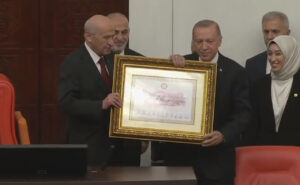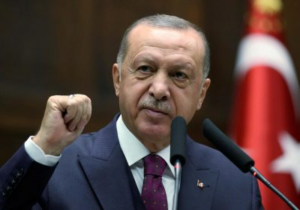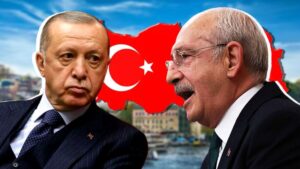
The Conservatives have won a majority of votes in the Iranian parliamentary elections, a number of Iranian media reported on Monday.
On March 4, the election commission completed the vote count in the elections to the country’s legislature. According to preliminary results, conservative candidates are leading in all provinces of Iran, including Tehran, local media reported.
The candidates will compete for 45 of the 290 seats in the parliament in the second round.
Approximately 25 million Iranian citizens took part in the March 1 elections to the country’s parliament and the Council of Experts. According to preliminary unofficial data, the turnout was approximately 41%.
A record number of candidates were allowed to participate in the parliamentary elections – more than 15.2 thousand people, which was almost 75% of the total number of candidates who initially registered. About 1.7 thousand of the candidates admitted to the elections are women.
According to the Iranian Constitution, five seats in the 290-seat parliament should go to representatives of religious minorities. 144 candidates competed for 88 seats in the Council of Experts, which elects the country’s Supreme Leader.
Many candidates who advocate reforms in Iran were banned from participating in the parliamentary elections, and some political figures, including former Iranian President Hassan Rouhani, were not allowed to run for the Council of Experts, Iranian media reported.
The first meeting of the newly convoked parliament will be held in late May.
Earlier, the Experts Club think tank made a video dedicated to the top 10 elections in the world this year. More detailed analysis is available at

In the world of politics, 2024 promises to be one of the most significant and dynamic periods, given the planned elections in almost 70 countries with a combined population of almost 4 billion people, which is more than in any other year in the history of the world. That is why many have already called 2024 the year of elections, and the results of some of them could be fateful for all of humanity. On the YouTube channel of the Experts Club think tank, we analyzed the top 10 most important elections in the world that could lead to dramatic changes in the international agenda.
The United States: the return of Donald Trump?
The most anticipated political event of 2024 is the presidential election in the United States scheduled for November 5.
“These elections could lead to significant changes in the political landscape of the world, with the potential return of former President Donald Trump being of particular interest. His candidacy has already sparked a lot of debate, in particular regarding his impact on American foreign policy, relations with allies, and support for Ukraine. The results of this election may determine America’s global course for the coming years,” said Maksym Urakin, founder of Experts Club.
Great Britain: time for change for the Conservatives?
The United Kingdom is also preparing for important parliamentary elections, which, according to the expert, could be a turning point for the ruling Conservatives.
“Prime Minister Rishi Sunak is facing many challenges, including polls that predict a ‘heavy defeat’ for his party. The elections in Britain could dramatically change the country’s political course,” emphasizes Maxim Urakin.
According to all the polls, the Conservatives are 15-20% behind Labor.
Taiwan: elections amid tensions with China
In Taiwan, where the presidential election is scheduled for January 13, the political situation is burdened by growing tensions with China.
Urakin notes that the elections in Taiwan could exacerbate geopolitical tensions in the region, especially between China and the United States.
“Of the three presidential candidates vying for victory, Lai Tsingde, who is the candidate of the ruling Democratic Progressive Party, is fiercely anti-Chinese. The second candidate, Hou Yu-yi of the opposition Kuomintang, wants to start negotiations with Beijing. The third candidate, Ko Wen-jeou of the Taiwan People’s Party (TPP) and former mayor of Taipei, offers an intermediate position closer to reconciliation. Polls favor the candidate with an anti-China stance,” the founder of Experts Club emphasized.
India: Elections in the World’s Largest Democracy
India, the world’s largest democracy, will also face important elections. It is expected that elections to the lower house of the Lok Sabha will be held in April-May.
“These elections are not only important for India, but also important for the entire international community, given India’s growing role on the world stage,” – Urakin said.
The year 2024 will undoubtedly be a year that will bring important changes in international relations and domestic policies of states that are key players on the world stage. Political analysts and experts are eagerly awaiting the results of these elections, which may set the global agenda for the coming years.
To learn more about the 2024 global elections, please watch the video here:
Subscribe to the Experts Club channel:

Turkish President Recep Tayyip Erdogan’s swearing-in ceremony was held Saturday at the Turkish parliament.
“The swearing-in ceremony and inauguration of Turkish President Recep Tayyip Erdogan took place Saturday, June 3, at the Turkish parliament building in Ankara,” Anadolu Agency reported.
The ceremony was attended by representatives from 78 countries, including the heads of state and government of 20 countries.
Erdoğan, 69, was elected to a third presidential term – until 2028.
Later, Erdoğan will lay a wreath at the mausoleum of Mustafa Kemal Atatürk, the founder and first president of the Republic of Turkey. A luncheon in honor of the guests who arrived for the event is also planned.
On Saturday, Erdogan will also name a new Turkish cabinet.
Erdogan won the second round of the Turkish presidential election, which was held on May 28. According to data after processing 99.75% of ballots, Erdogan received 52.1% of the votes, while his opponent, opposition leader Kemal Kılıçdaroğlu, won 47.9%.
Earlier, a video on the Club of Experts channel analyzed the situation in Turkey after the elections. The full video can be seen at the link:

Turkish President Recep Tayyip Erdogan said on Sunday that he had won the presidential election.
“Our nation has made a choice and once again empowered us to lead the country for another five years,” Erdogan said, addressing his supporters at a rally.
He thanked all Turkish citizens who voted for him.
The presidential election in Turkey is already being called the main election of 2023 in the world. The pre-election economic and political situation in Turkey was analyzed by the Club of Experts research center, watch the video with the Club’s experts here:
The presidential election in Turkey is already being called the main election of 2023 in the world. The pre-election economic and political situation in Turkey was analyzed by the research center of the Club of Experts, watch the video with the Club’s experts here:

On May 28, the second round of presidential elections is taking place in Turkey. After the first round, none of the candidates received more than 50% of the votes, which would guarantee victory and election as president of this country. The incumbent President Recep Tayyip Erdoğan and Kemal Kılıçdaroğlu of the united opposition are fighting for this post.
Polling stations started working at 8:00 local time and will be open until 17:00. There are 191,885 ballot boxes in 973 constituencies and 1,094 district election commissions across the country. In total, more than 60 million citizens of the country are expected to take part.
Abroad, 3.5 million Turkish citizens registered there could cast their votes for the new president. Election commissions worked in 73 countries, and voting in foreign representations ended on May 24. The ballot boxes from abroad were delivered to Ankara by air and diplomatic mail. They will be opened together with other ballot boxes after voting is over.
Turkey’s presidential election has already been called the world’s most important election of 2023. The analysis of the pre-election economic and political situation in Turkey was carried out by the Club of Experts Research Center, see the video of the Club’s experts at the link:

The two presidential candidates in Turkey visited polling stations almost simultaneously and voted in the second round of presidential elections.
According to the Turkish press, President Recep Erdoğan voted at a polling station in the Asian part of Istanbul, while his opponent Kemal Kılıçdaroğlu voted in Ankara.
Polling stations opened in Turkey at 08:00 am local time (the same time as Kiev), they will close at 17:00, after which the ban on the publication of voting data will be lifted.
Earlier, the “Club of Experts” analyzed the prospects of candidates in the second round of elections. You can view the video here:
Subscribe to the Experts Club channel by clicking here:
https://www.youtube.com/@ExpertsClub